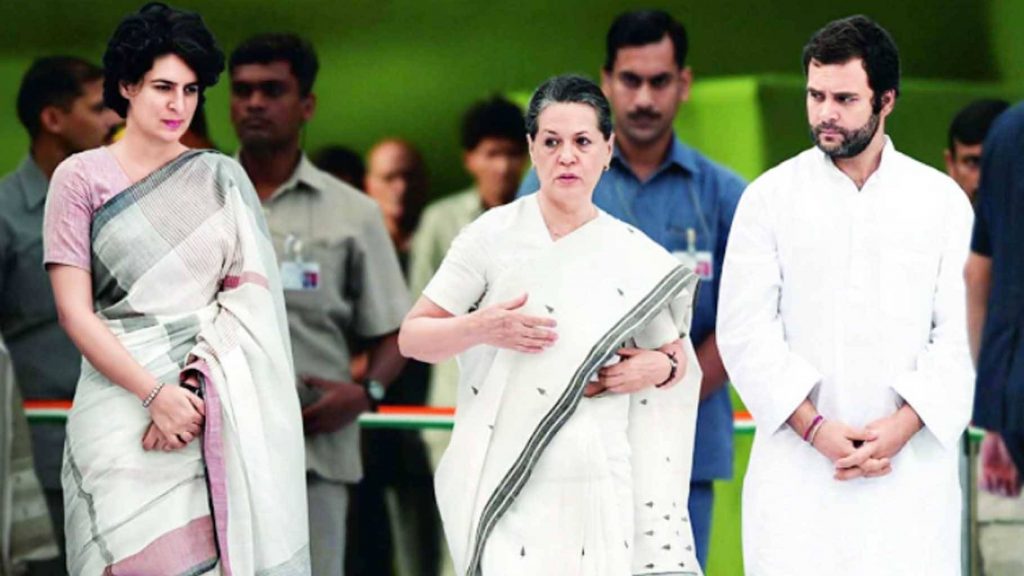New Delhi: The Special Protection Group (SPG) security cover given to Congress president Sonia Gandhi, her son Rahul and daughter Priyanka was withdrawn on Friday, 28 years after the elite force’s continuous deployment, and it was replaced by the ‘Z-plus’ security of the CRPF, officials said.
The government’s decision to withdraw the SPG cover given to the family of former Prime Minister Rajiv Gandhi, who was assassinated by LTTE terrorists on May 21, 1991, was taken after a detailed security assessment, a senior Home Ministry official said.
The 3,000-strong SPG, which acts as a ‘shadow’ to its protectees to ensure ‘zero-error security’, will now be guarding only Prime Minister Narendra Modi.
The Home Ministry official said security cover for all VIPs is reviewed periodically and recommendations are made based on threat perceptions by various security agencies in the country. “The Gandhi family continues to have ‘Z-plus’ security cover,” the official said.
Giving out the reasons for the decision, another official said the threat perception has reduced and the Gandhi family no longer faces serious security threats.
The decision to remove the SPG from the residences of Sonia Gandhi, Rahul and Priyanka saw angry reactions from Congress leaders with Gandhi’s close aide Ahmed Patel describing the move as ‘descended to the ultimate personal vendetta mechanism’ by the BJP government.
Congress senior spokesperson Anand Sharma said the decision to remove the SPG cover is ‘shocking and vindictive’ and ‘makes the family vulnerable’.
“Not to forget that two members of the family — former prime ministers Indira Gandhi and Rajiv Gandhi — were assassinated. The state has a duty to protect, and the SPG cover was not a favour,” he said.
Another Congress leader K C Venugopal alleged that “Prime Minister Narendra Modi and Home Minister Amit Shah are blinded by personal revenge and political vendetta in withdrawing SPG cover from Gandhis”.
Congress chief ministers from Punjab and Rajasthan Amarinder Singh and Ashok Gehlot, respectively, also joined in chorus with other party leaders and criticised the move.
While Singh termed the move as ‘politically motivated’, Gehlot said it was a ‘mental bankruptcy’ of the central government leadership who have ‘resorted to very low level politics.’
The Gandhis will be without SPG protection for the first time in 28 years. They were included in the VVIP security list following an amendment in September 1991 in the SPG Act of 1988 under which immediate family members of former prime ministers were incorporated by the then P V Narasimha Rao government.
The Act was amended more than a year after the assassination of Rajiv Gandhi to include the immediate family members of the former prime ministers.
Under the ‘Z-plus’ security by the Central Reserve Police Force (CRPF), they will have commandos from the paramilitary force in close proximity, besides guards at their homes and wherever they travel in the country, the official said.
The SPG protectees, under the rules, are provided with guards, hi-tech vehicles, jammers and an ambulance in their carcade.
In August this year, the government withdrew the SPG cover of former prime minister Manmohan Singh.
The SPG Act, enacted by Parliament in 1988, was initially supposed to provide security to only the prime minister and his or her immediate family members and to the former prime ministers of the country for 10 years. In 2003, the Act was amended and the time frame of 10 years was reduced to one year.
The need for a separate force for guarding the prime minister of the country was felt after then prime minister Indira Gandhi, the mother of Rajiv Gandhi, was assassinated by her security guards on October 31, 1984.
After her death, a committee was constituted to review the security of the prime minister of the country.
It recommended the formation of a Special Protection Group (SPG). In 1985, an inspector-general rank officer was nominated as its first director and the organisation continued to function on an executive order for another three years.
(PTI)
